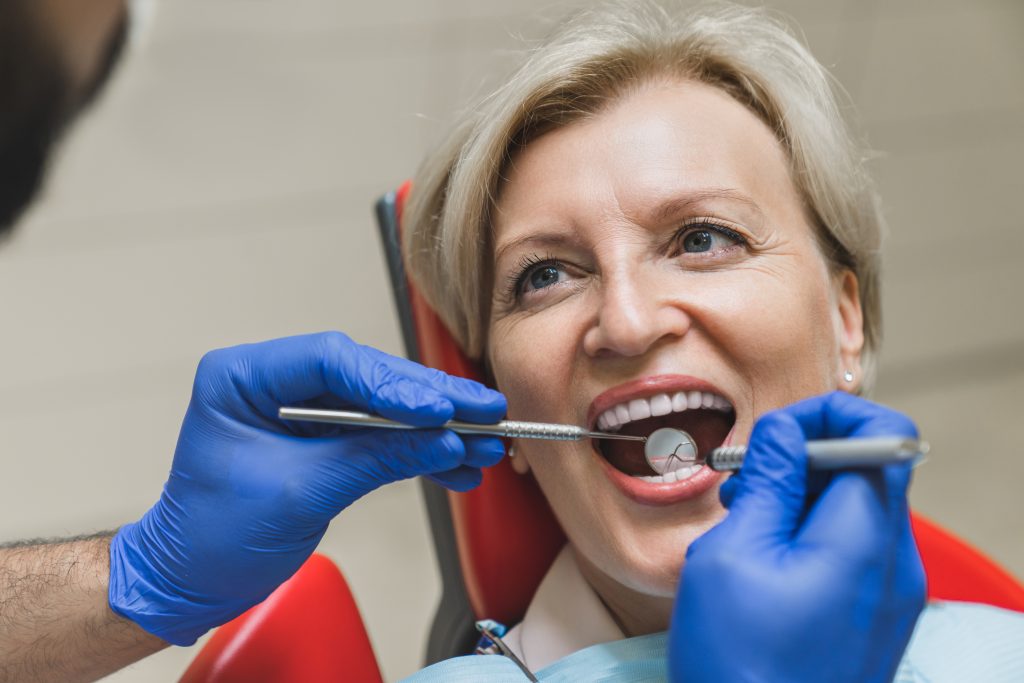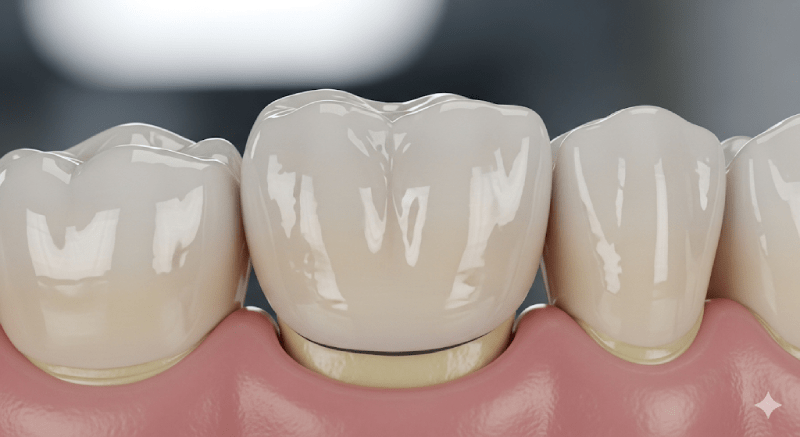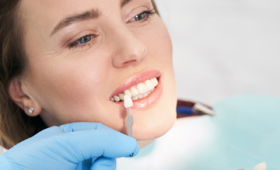Dental Crowns in Turkey: Frequently Asked Questions
Dental crown treatment is a popular solution for teeth that are damaged, weakened, or in need of aesthetic improvement. Dental crowns completely cover the natural tooth, providing both protection and a better appearance. Turkey has become an international hub for this procedure, offering high-quality and affordable treatments. This article answers the 35 most frequently asked questions about dental crown treatment in Turkey.
What Is a Dental Crown and Who Is It Suitable For?
A dental crown is an artificial cap placed over a damaged tooth. It’s an ideal solution for various dental problems, including teeth with extensive decay, significant fractures, or those that have become weak due to a large filling or a root canal procedure.
Beyond restorative purposes, crowns can also serve aesthetic functions, such as supporting a dental bridge or improving the shape, alignment, or color of a tooth to enhance your smile. This versatility makes them a suitable option for a wide range of patients.
Why Are Dental Crowns Cheaper in Turkey?
The affordability of dental crowns in Turkey is primarily due to the country’s economic structure. Lower labor costs, operational expenses, and a favorable exchange rate for foreign currencies allow clinics to offer high-quality services at a fraction of the price found in many Western countries.
This doesn’t indicate a lower standard of care. Instead, it reflects a well-developed medical tourism industry where clinics operate efficiently and compete to attract international patients, passing on the cost savings without compromising on the quality of materials or expertise.
How Much Do Dental Crowns Cost in Turkey?
The price of a dental crown in Turkey is a flexible cost influenced by several factors, including the type of material, the dental clinic’s location, and the complexity of the procedure. On average, a zirconium crown may cost between 170€ and 250€ per tooth, with porcelain crowns being slightly more affordable. These prices are significantly lower than in many European countries or the United States, making the treatment accessible to a much broader audience. It’s always best to get a specific quote from your chosen clinic for an accurate estimate.
What Are the Different Types of Dental Crowns and How Do Their Prices Vary?
Turkey offers a variety of dental crown materials to suit different needs and budgets. The most common options are Zirconium, Porcelain (E-max), and Porcelain Fused to Metal crowns. Zirconium crowns are the most popular due to their exceptional durability and natural, translucent appearance, making them ideal for front teeth.
Porcelain fused to metal crowns are a more budget-friendly option that combines the strength of a metal base with a porcelain veneer, suitable for back teeth where chewing force is greater. The cost varies based on the material’s properties and aesthetic quality.
How Long Does a Dental Crown Procedure Take?
The dental crown procedure is a two-stage process that typically spans over a few days. The first appointment involves preparing the tooth and taking an impression, while the final crown is fabricated in a dental lab.
This step usually requires 3 to 7 days, during which a temporary crown is placed to protect the tooth. The second visit is for the permanent fitting and bonding of the new crown. This streamlined process allows patients to complete their treatment efficiently during a short visit to Turkey.
Will I Feel Pain During the Procedure?
The dental crown procedure is designed to be as comfortable as possible. Local anesthesia is administered to completely numb the area around the tooth, so you won’t feel any pain or discomfort during the process.
After the procedure, it’s common to experience some mild sensitivity or slight discomfort, but this is temporary. Your dentist will prescribe painkillers to manage any post-operative symptoms, which typically subside within a few days as the tooth and gums heal.

How Long Do Dental Crowns Last?
The longevity of your dental crowns largely depends on the material used and how well you maintain them. With proper care and good oral hygiene, a high-quality dental crown can last for 10 to 15 years or even longer.
To ensure their durability, you should avoid biting on hard objects and maintain a consistent oral care routine, including daily brushing, flossing, and regular dental check-ups. Regular visits to the dentist are key to monitoring the crown’s condition and addressing any potential issues early on.
Are Dental Crowns in Turkey of High Quality?
Yes, dental crowns from reputable clinics in Turkey are of high quality. The country’s dental clinics are equipped with advanced technology and use top-grade materials sourced from well-known international manufacturers.
Many clinics hold international accreditations, and their dentists are highly skilled professionals with extensive experience in cosmetic and restorative dentistry. Despite the competitive prices, the commitment to quality ensures that patients receive durable, aesthetically pleasing, and long-lasting dental restorations that meet global standards.
Is It Safe to Travel to Turkey for Treatment?
Traveling to Turkey for dental treatment is considered very safe, provided you choose an accredited and reputable clinic. These establishments adhere to strict international hygiene and safety protocols. To make the process as seamless as possible, many clinics offer comprehensive packages that include services like airport transfers, accommodation, and interpreter support. This not only ensures your safety but also makes the entire experience stress-free and convenient, allowing you to focus on your treatment and recovery.
What Should I Be Careful About After Treatment?
Proper aftercare is essential for the longevity of your new dental crowns. You should maintain the same level of oral hygiene as you would for your natural teeth, including brushing twice a day and flossing daily. It is important to avoid biting or chewing on very hard foods, which could damage the crown. If you have a habit of grinding your teeth (bruxism), your dentist may recommend wearing a protective night guard to prevent excessive wear and tear on your new crowns.
Will There Be Sensitivity After Treatment?
It is common to experience some slight sensitivity in the tooth and surrounding gum tissue in the first few days after a dental crown is placed. This sensation is a normal part of the tooth’s adjustment to the new crown and typically fades away on its own within a short period. If the sensitivity persists for more than a few days or becomes more severe, it is advisable to contact your dentist to ensure that the crown’s fit is correct and there are no underlying issues.
What Materials Are Used for Dental Crown Treatment?
The primary materials used for dental crowns in Turkey are zirconium, porcelain, and porcelain fused to metal. Zirconium is a strong, biocompatible material with excellent aesthetic properties, making it an ideal choice for crowns on visible teeth. Porcelain offers a natural look and is often used for crowns that need to blend in seamlessly with existing teeth. Porcelain fused to metal crowns combine the strength of a metal substructure with the aesthetic appeal of a porcelain layer.
Why Do Clinics in Turkey Offer Package Prices?
Clinics in Turkey offer all-inclusive packages to simplify the process for international patients. These packages typically cover the cost of the dental procedure, accommodation, airport transfers, and sometimes even interpreter services. This business model provides a predictable total cost and eliminates the stress of arranging travel and logistics separately. It’s a key reason why Turkey has become a leading destination for medical tourism, offering both high-quality care and a convenient travel experience.
Are Two Separate Visits Necessary for Dental Crown Treatment?
Yes, the dental crown procedure generally requires two separate visits. The first visit is for the initial consultation, tooth preparation, and taking impressions. A temporary crown is then placed. During the second visit, after the permanent crown has been meticulously crafted in the lab, your dentist will bond it to your tooth. This two-step approach is crucial for ensuring a perfect fit, a comfortable bite, and a natural appearance, and it guarantees the highest quality outcome.
How Natural Will My Teeth Look After Treatment?
When performed by an experienced dentist using high-quality materials, dental crowns are designed to look incredibly natural. They are custom-made to match the shape, size, and color of your surrounding teeth, ensuring a seamless blend with your smile. Materials like zirconium and full porcelain crowns are particularly effective at mimicking the translucent properties of natural tooth enamel, making them virtually indistinguishable from your other teeth and providing excellent aesthetic results.
Does Dental Crown Treatment Improve My Oral Health?
Yes, dental crowns can significantly improve your oral health. They act as a protective shield for damaged or weakened teeth, preventing further decay or fracture. By restoring the tooth’s structure, they also improve your ability to chew and speak. Furthermore, in cases where a crown is used to support a dental bridge, it helps to maintain the proper alignment of your teeth and jaw, preventing shifting and potential long-term dental issues.
Should I Travel to Turkey Just for a Dental Crown?
Given the significant cost savings and high quality of care, it is very sensible to travel to Turkey for a dental crown, especially if you need multiple crowns. The total cost, even including flights and accommodation, is often substantially less than the price of a single crown in many Western countries. The trip can also be combined with a holiday, allowing you to receive top-tier dental care while enjoying a cultural experience in a beautiful country.
Who Is the Best Candidate for a Dental Crown?
The best candidates for a dental crown are individuals with a tooth that has been severely damaged by decay, is cracked, or has a large filling that compromises its integrity. A crown is also a great option for those who have had a root canal and need to strengthen the tooth. Additionally, individuals who are looking to correct cosmetic imperfections such as discoloration, misshapen teeth, or alignment issues are excellent candidates.
What Preparations Are Done Before a Dental Crown Is Placed?
Before a dental crown is placed, the dentist performs a detailed preparation process. This involves removing any decay or damaged parts of the tooth and carefully reshaping the tooth to make room for the crown. An impression of the prepared tooth is then taken to serve as a model for the dental lab. This meticulous preparation ensures that the new crown will fit perfectly and provide a long-lasting, durable restoration.
How Long Are Temporary Dental Crowns Used?
Temporary dental crowns are an essential part of the two-stage treatment process. They are placed after the initial tooth preparation to protect the sensitive tooth from temperature changes and pressure. Additionally, they help maintain the space and prevent surrounding teeth from shifting. Temporary crowns are typically worn for one to two weeks while the permanent crown is being custom-made in the lab.
Which City Should I Choose for My Dental Crown in Turkey?
Turkey offers several excellent cities for dental tourism, with Istanbul, Antalya, and Izmir being the most popular choices. Istanbul is a top destination due to its high number of internationally accredited clinics and its status as a major travel hub. Antalya and Izmir are also excellent options, particularly for those who want to combine their dental treatment with a beach holiday in a beautiful coastal city.

Will There Be a Change in My Speech After Treatment?
After your new dental crowns are placed, it is normal to feel a slight difference in your bite and speech. However, this adjustment period is usually very brief. Your new crowns are designed to be a precise replica of your natural teeth, so they should feel comfortable and look entirely natural. Any initial changes in speech are temporary and will quickly return to normal as you get used to the feel of the crowns.
What Are the Side Effects of Getting a Dental Crown?
The side effects of a dental crown procedure are typically minor and temporary. The most common ones include mild sensitivity to hot or cold temperatures, slight pain, and gum redness. Serious complications like infection or an allergic reaction to the materials are extremely rare, especially when you choose a reputable clinic with experienced professionals. Any prolonged side effects should be reported to your dentist for a follow-up examination.
Do Clinics in Turkey Provide Patient Follow-up?
Yes, reputable clinics in Turkey are committed to providing comprehensive patient care. They will schedule a follow-up appointment shortly after the procedure to ensure everything is healing properly and to answer any questions you may have. Many clinics also offer long-term remote follow-up support via phone or email, which is very convenient for international patients once they return to their home country.
How Far in Advance Should I Book an Appointment?
It is highly recommended to book your dental appointment in Turkey at least a few weeks in advance. This is especially important if you are traveling during peak tourist season or if you are seeking a consultation with a particularly popular or specialized dentist. Booking in advance ensures that you can secure your desired dates and allows the clinic to properly prepare for your visit and organize any necessary travel and accommodation arrangements.
Are There Medical Guarantees for Dental Crowns?
Yes, many reputable dental clinics in Turkey provide a guarantee or warranty for their dental crowns. This guarantee typically covers issues such as a cracked or broken crown within a specific timeframe, offering a free repair or replacement. The terms and conditions of these guarantees can vary between clinics, so it is important to discuss them with your dentist before starting the treatment to have peace of mind.
Do Dental Crowns Affect My Gums?
A properly placed dental crown will not negatively affect your gums. In fact, when done correctly, the crown’s margins are designed to be perfectly flush with the gum line, promoting gum health. However, a poorly fitting crown can irritate the gum tissue and lead to inflammation or gum recession. This is why choosing a highly skilled and experienced dentist is crucial for a successful outcome that is both aesthetic and healthy for your gums.
When Is the Best Time to Get Treatment in Turkey?
You can get dental crown treatment in Turkey at any time of the year. However, many people prefer to combine their dental trip with a holiday. For those who want to avoid high tourist traffic and extreme heat, the spring (April-May) or autumn (September-October) months are ideal. The weather is pleasant, and the clinics and tourist areas are less crowded, allowing for a more relaxed and enjoyable experience.
Are Dental Crown Prices All-Inclusive?
The price quoted for a single dental crown generally covers the procedure and the crown itself. However, many clinics, especially those catering to international patients, offer all-inclusive package prices. These packages provide a transparent total cost, including the procedure, airport transfers, and sometimes even accommodation. This approach makes it easy for patients to budget without worrying about hidden fees.
Do Dental Crowns Whiten My Teeth?
Dental crowns themselves do not whiten the natural teeth. The color of the crown is chosen to match your natural tooth shade at the time of the procedure, and once it’s permanently bonded, its color cannot be changed. Therefore, if you wish to have a brighter smile, it is recommended to get professional teeth whitening done on your natural teeth before getting your dental crowns.
What Information Should I Share Before Going to Turkey?
Before traveling to Turkey for your dental crowns, it is essential to provide your dentist with a complete medical history. This includes information about any pre-existing medical conditions, allergies, and a list of all current medications you are taking. Sharing high-quality photos and recent dental X-rays of your teeth is also helpful for your dentist to perform a preliminary assessment and plan your treatment.
What Are the Risks of Getting a Dental Crown in Turkey?
While dental crown procedures in Turkey are very safe, some risks are associated with any dental work. These can include post-operative sensitivity, infection, or a crown that doesn’t fit properly. However, these risks are significantly minimized by choosing a reputable clinic that uses sterilized equipment and has experienced dentists who follow meticulous procedures.
For more information on a personalized dental crown treatment plan, please contact Cure Holiday.



